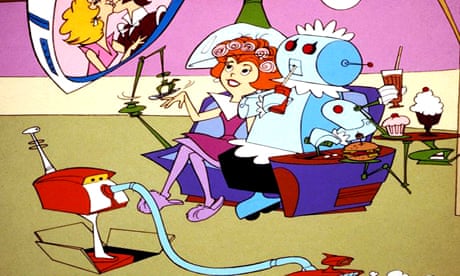When both Steve Jobs and Bill Gates announce something separately but simultaneously, you know it ought to be important. And so it was with the "digital home" and especially the idea that computers would be the "digital hub" of the home, which – weirdly, because I don't think they rang each other up to coordinate it – both Jobs and Gates did in January 2001 at their respective speeches at Macworld in San Francisco and the Consumer Electronics Show in Las Vegas.
And around about now, that vision is coming true. Except that it's not the computer they thought which is at the hub. It's a rather different one that hadn't even been considered at the time, using a technology that had only just begun to get traction. That would be the iPod Touch, and Wi-Fi.
Here's Chris Espinosa (an Apple employee) as an example. Here's what he was doing last night: "Enforcing kids' bedtime by VNCing into their Mac from my iPhone and closing their windows. Modern tough Dad." (VNC is a remote access program: you tell it the IP address of the machine you want to go to, and if it's set up to allow you in, you can control it right there.)
OK, so to many that's a method that's beyond geeky – is it so much trouble to talk? – but it's indicative. I think Wi-Fi-enabled devices, plus Wi-Fi, are the real home hubs that Gates and Jobs had begun to imagine. But they couldn't really describe them then without sounding too futuristic.
Take another product: earlier this week I was stunned by the quality and ease of the iPhone/iPod Touch controller for the Sonos multi-room music system. A free software download can transform your iPhone or Touch into a controller for the wireless system, which can play different tracks (or internet radio, or stuff from a line in, such as your TV set) all around your house. Very impressive when you consider that the stand-alone controller costs £279. (The software to control the system is also a free download for your computer, but who wants to be jumping up and down twiddling their computer rather than listening to music?)
And another: the latest release of Keyboard Maestro, a key-capture-macro-launcher program for the Mac: it "adds to the macro utility a Keyboard Maestro Control app for the iPhone and iPod touch that enables users to execute any macro from your iPhone or iPod touch, just as though you were sitting at your Mac. Possible uses include launching or quitting applications, restarting or shutting down the Mac... iTunes song rating capabilities for the current track, iTunes volume controls, and a variety of interface refinements." To me, that sounds worth the price of the upgrade (I've got an ancient version) on its own.
Together these technologies are creating an environment where you can control all sorts of devices around the house from that small handheld device. A growing number of homes use Wi-Fi – it's the only connection the Wii comes with, and wireless routers are being pushed for all they're worth by BT and other broadband providers. (About time; those USB broadband modems are beneath useless.)
To be honest, I've been expecting something like this for ages. When the rumours began flying in October 2001 of some "revolutionary" product Apple was going to introduce, I thought that the obvious thing was a Wi-Fi tablet that would connect to your computer and network and do things. (I'd already discovered the joys of Wi-Fi in January 2001.) So when Jobs announced a digital music player - the same sort of thing Rio had been doing for years – I was, to say the least, disappointed. Which is why I kept expecting the iPod to be turned into a platform. Which now, of course, it is.
And Wi-Fi is really making inroads at home. Almost 30% of homes have it, according to research by Forrester, against only 12% with a wired home network. Even in 2003, nearly a third of US broadband users at home used Wi-Fi. (Feel free to be amused by the phrase in that story which talks of "lean economic times", by the way.) Even a drive-by test by Peter Cochrane, plus a bit of figure-wrangling, suggests at least 7% of homes using it in early 2007. These things cascade.
The mistake that other companies have made is in thinking that you want to have their remote control to do these things. You don't, any more than you want a remote control for every single gadget in your house (even though that's how it ends up). Universal Remote Controls tend to sell well (even though Stephen Fry swears he's never found a good one).
None of this precludes other companies from making their own machine that you can use to control your network-aware devices. The problem is, they won't have the penetration. The iPod has driven all before it, and the iPhone shows signs of doing precisely the same in the smartphone market. I'd advise companies like Microsoft (with Windows Mobile) and Google (with Android) to start cosying up to companies like Sonos pronto. Not, of course, that they need much encouragement from me.
But now, the universal remote is on the way. Network-connected devices just need to listen for their orders over the network, and with Wi-Fi you've got a way in. (So if you update your favourite radio stations or playlists for the Sonos gear on your iPod Touch, that's transmitted to the related devices, including the dedicated controller, if you have one.)
But this is only the first step. Think bigger. Do you know what the temperature is in all the rooms of your house? Is the hot water on? As it gets easier to make sensors that can talk to the network as well, it becomes easier to control your home via a real home hub. Turn the radiators down in rooms you aren't in. Turn off the hot water. Let your home tell you how it is. (An example: Andy Stafford-Clark of IBM has a home with a Twitter feed. How's his hot water doing? And you can read more at this page.)
And if that weren't enough to convince you that this is all coming down the rails like a train without brakes, there's Bill Thompson, who describes his connected home to the BBC's Rory Cellan-Jones:
We watched as Bill and his 16-year-old son Max put the system through its paces – selecting iPlayer programmes to stream onto the wall, watching YouTube videos, and using the Xbox 360 – not just to play games, but to store and play video previously downloaded to Bill's desktop computer.
Yup, it's all coming. Hell, it's about time that we could see some gleams of light amidst all this depressing talk. Let's build ourselves out of the recession. Technology seems as good a way as any.

